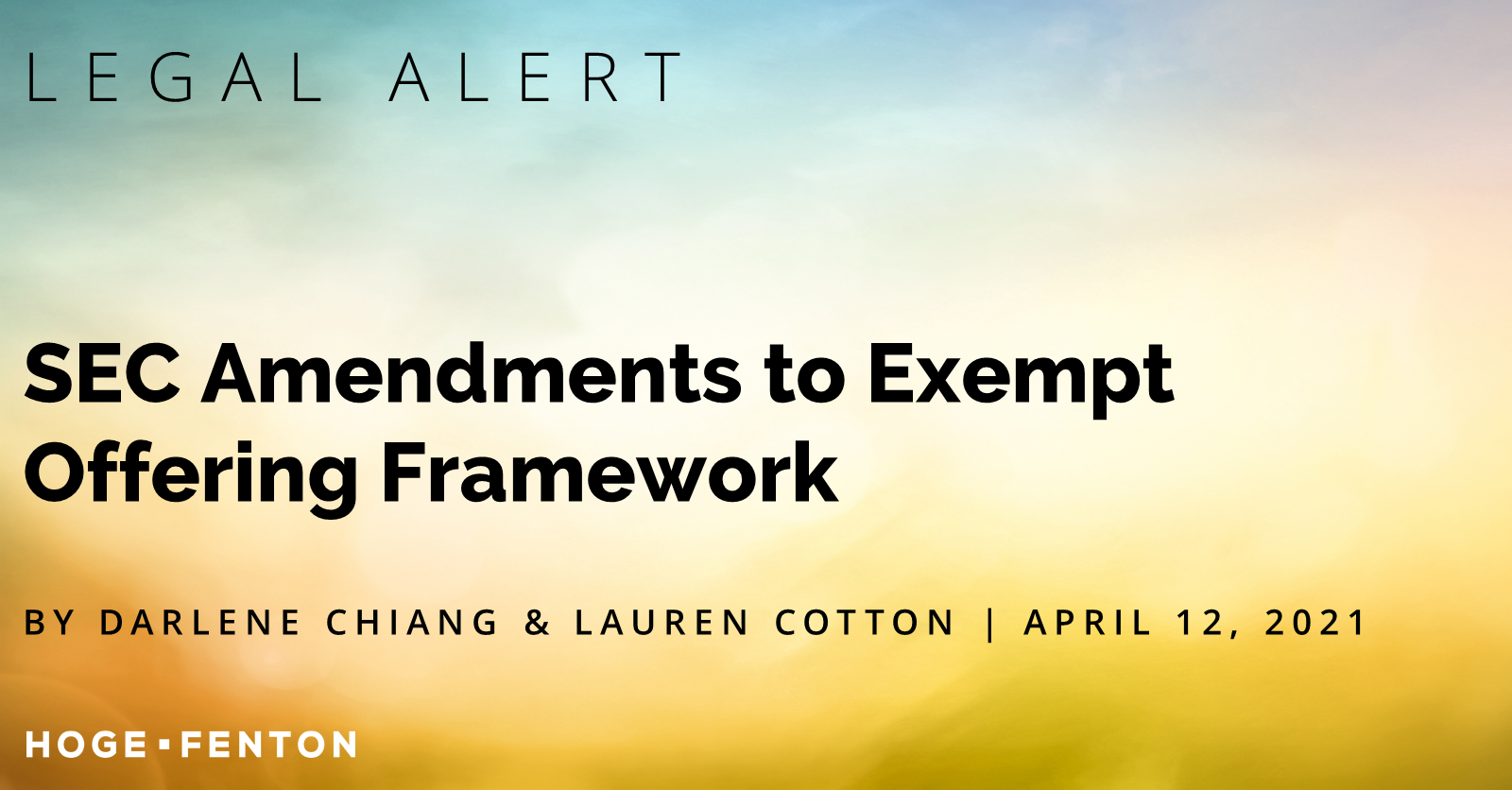SEC Amendments to Exempt Offering Framework
By Hoge Fenton | 04.12.2021 | Corporate & Business Law

The Securities and Exchange Commission has amended certain rules under the Securities Act of 1933 expanding the scope of exemptions from registration. The amendments went into effect on March 15, 2021. The rules amendments were made in order to harmonize, simplify, and improve the multilayer and overly complex exempt offering framework. Specifically, the amendments address gaps and complexities in the exempt offering framework that impede access to capital for issuers and access to investment opportunities for investors. These amendments are the next step in the SEC’s effort to improve the exempt offering framework for the benefit of investors, emerging companies, and more seasoned issuers. The most significant changes include:
New Integration Framework
When issuers issue securities in different or successive offerings using different private offering exemptions in parallel, or in close time proximity, questions arise as to whether the offerings will be “integrated” (or viewed as a single offering) for purposes of determining compliance with the exemptions. New Rule 152 provides four safe harbors to avoid integration applicable to all securities offerings under the Securities Act, including registered and exempt offerings.
Moving past the prior approach which based the integration safe harbor on a six-month time period between offerings, the new approach looks to the particular facts and circumstances of two or more offerings, and focuses the analysis on whether the issuer can establish that each offering either complies with the registration requirements of the Securities Act, or that an exemption from registration is available for the particular offering.
New Integration Safe Harbors
The amendments additionally provide four non-exclusive safe harbors from integration:
- Any offering made more than 30 calendar days before the commencement of any other offering, or more than 30 calendar days after the termination of any other offering, will not be integrated with such other offering;
- Any offer or sale made in compliance with Rule 701, pursuant to an employee benefit plan, or in compliance with Regulation S will not be integrated;
- Any offering for which a registration statement is filed will not be integrated if it is made after: (i) a terminated or completed offering which did not permit general solicitation (i.e., 506(b) of Regulation D offering); (ii) a terminated or completed offering for which general solicitation is permitted that was made only to qualified institutional buyers and institutional accredited investors; or (iii) an offering that permitted general solicitation (i.e., 506(c) of Regulation D offering) that terminated or was completed more than 30 calendar days prior to the commencement of the registered offering; and
- Any offer or sale made in reliance on an exemption that permits general solicitation will not be integrated if made subsequent to any terminated or completed offering.
Demo Days
Certain “demo day” communications are now exempt from registration requirements under the amendments made to Rule 148. This new rule allows the issuer to provide “demo day” communications to investors which will not be treated as a general solicitation. It enables the issuer to state that it is raising capital when discussing its business plan with potential investors without jeopardizing its ability to rely on Rule 506(b) for the offering which prohibits general solicitation.
Testing the Water Rules
The amendments created a new exemption under Rule 241 pursuant to which issuers now have the ability to “test the waters” for exempt offerings. The new rule permits an issuer to solicit indications of interest in a potential exempt offering either orally or in writing, provided that the issuer must not have settled on a specific exemption upon which it intends to rely for the potential offering. The rule is designed to allow issuers to gauge market interest, tailor the size and other terms of an offering, and reduce the costs of conducting an exempt offering.
Verification Rules for Accredited Investors
Rule 506(c) permits general solicitation in a Rule 506 offering if sales are made only to accredited investors; however, it requires the issuer to take reasonable steps to “verify” that its investors qualify as accredited investors, rather than just rely on each investor’s self-certification. Under the new amendments to Rule 506(c), if an issuer took reasonable steps to verify an investor’s accredited investor status within the past 5 years, then that investor will remain as an accredited investor as of the time a subsequent sale if the investor can provide the issuer a written representation that it continues to qualify and the issuer is not aware of information to the contrary.
Increased Maximum Offering Amounts
| Offering Type | Previous Maximum Offering Amount | New Maximum Offering Amount |
| Rule 504 | $5 million | $10 million |
| Tier 2 of Regulation A | $50 million | $75 million |
| Secondary Sales Under Tier 2 of Regulation A | $15 million | $22.5 million |
| Regulation Crowdfunding | $1.07 million | $5 million |
The amendments give investors and entrepreneurs more tools and flexibility around offerings, and will allow for more diversity of investors. Hoge Fenton advises clients in Crowdfunding and Regulation D exempt offerings through different stages of a company’s lifecycle. We also represent both investors and issuers. Questions and concerns regarding the above changes should be directed to our experienced attorneys who eager to help you find the best path for your company.
 |
 |
| Darlene Chiang
Of Counsel Corporate & Bus Law +1.925.460.3367 |
Lauren Cotton
Attorney Corporate & Bus Law +1408.947.2472 |
This information is provided as an educational service by Hoge Fenton for clients and friends of the firm. This communique is an overview only, and should not be construed as legal advice or advice to take any specific action. Please be sure to consult a knowledgeable professional with assistance with your particular legal issue. © 2021 Hoge Fenton










